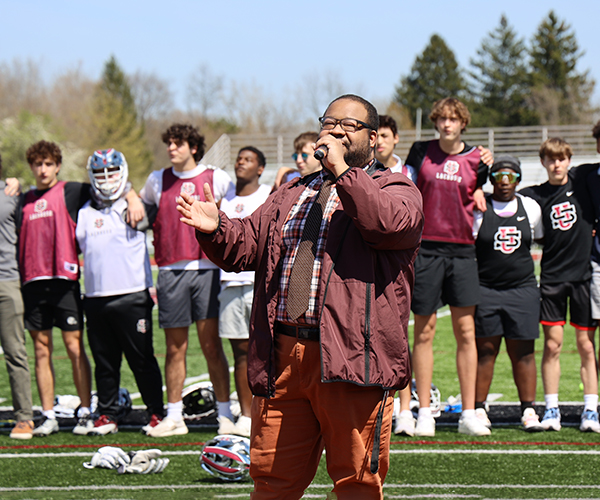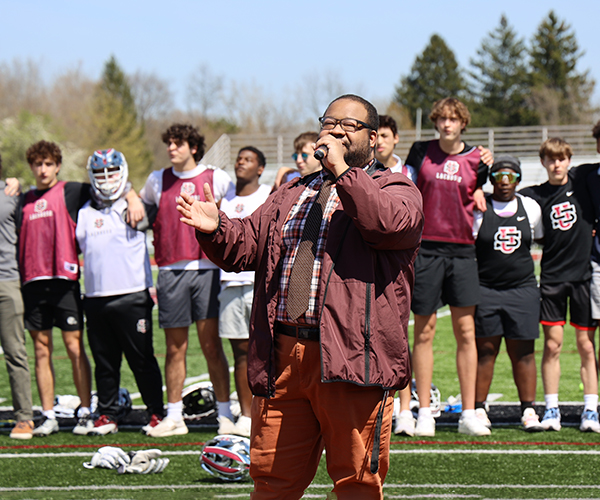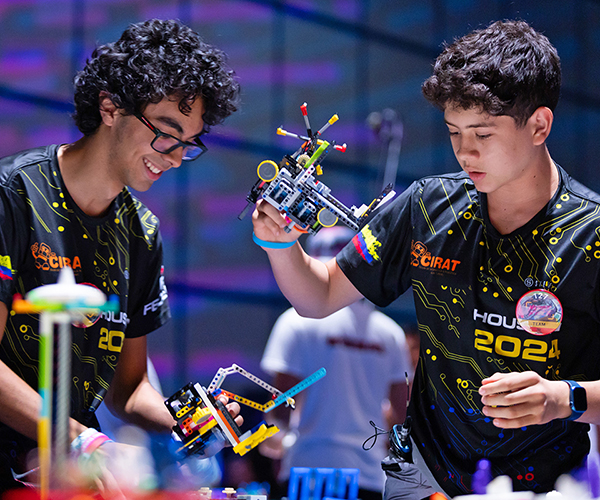Question: What is the main advice you give to parents looking at a new school for their child?
Answer: “The most important thing is to visit the school, to sit in on classes and observe how the students interact with their teachers and with each other,” says Chris Barton, director of enrollment and admissions at University School. “Look around: Do the children look busy and happy? Are they engaged in what’s going on? Are teachers enthusiastic and interested in their charges? Is the student body diverse? What about the physical environment? Is it stimulating and conducive to learning?”
Q. How should parents approach school open houses in the search for the right fit for their child?
A. “First, parents really need to know their child and know how they respond to different things,” says Judy Brookhart, director of admissions at Old Trail School. “Then, parents need to do their homework and really research the schools before they go to open houses. Once they find a school they are looking for, parents should ask the teachers and administrators if they can observe classrooms at all different levels and ages. Parents should also take this opportunity to talk with other parents who have children enrolled in the school. Parents should ask good questions that are from their hearts. When they have finished, they should feel like this is the right place because it just feels good.”
Q. What type of physical environment should parents be looking for in a school?
A. “Parents should be making sure that there are several windows, and it should be bright. There should be windows looking outside and windows looking into all of the classrooms,” says Lisa Fisher, marketing and public relations at The Goddard School. “The bathrooms should be size appropriate and there should be several emergency doors that lead to a secure area outside. All of the equipment in the school should be in good shape. Parents should really concentrate on the health and safety aspects of the classrooms and the school as a whole.”
Q. What should parents be looking for when they are observing a classroom setting?
A. “The relationship between students and staff should really be watched closely. Parents should try to get a view of what kind of relationship teachers have with their students both outside and inside the classroom,” says Kristina Dooley, director of admissions at The Andrews School. “Teachers should be available for individual consultation. Parents should also access the outcomes of other students who attend the school. Parents should know what students are doing after they graduate from the school.”
Q. What questions should parents or students ask when they visit a school?
A.“Is the school accredited and by whom? What is the school’s mission and does its philosophy appeal to you?” says Britt Flanagan, dean of admissions at Western Reserve Academy. “Does the school have a special or particular educational focus? How rigorous are the academics? How does my child’s academic profile compare with others at that school? How large is the school and its student body? Where is the school located and what are your transportation options? What is the tuition and how flexible are the school’s financing options? If applicable, are there financial aid or merit scholarships available? What is the school’s application process? Are deadlines drawing near?”
Q. What are some advantages that private schools offer to students?
A. “An independent school provides parents with the hope, almost a guarantee, that their child will be known by their teachers. The child’s talents, potential and areas of weakness are identified and talented teachers provide attention, as well as instructional design, to maximize those areas,” says Devin Schlickmann, dean of admissions and director of institutional advancement at Gilmour Academy. “Parents also are looking for something more for their investment. In a society and culture that can be so conflicted and confusing, a moral compass may be the most important lesson any school can provide to its students. Gilmour, as a faith-based school, provides that daily in conjunction with the values a student is learning at home.”
Q. Should the parent or the child have final say on what school he or she attends?
A. “Choosing a Catholic high school is a major decision for a family. Although it is important to allow a student to have input into the decision, I believe it is a decision that must be guided by a parent’s experience and wisdom,” says Sr. Maureen Burke, principal at Regina High School. “The decision-making process should involve a variety of steps. It is important that the school and the family agree on the basic fundamentals of education. This can be done by analyzing the school’s mission and philosophy. Is there a resonance with what you want for your child? What unique characteristics does the mission statement convey: Catholic? Single sex? Is the school sponsored by a religious order? Is the school college preparatory?”
Q. What advantages can single-sex education provide?
A. “They can provide a commitment to Catholic traditions and values,” says Peggy Connell, principal at Beaumont School. “At Beaumont, we believe in a liberal arts education with emphasis on educating the whole person. In addition to academics, extra-curricular activities attract and stimulate unique talents and interests and impact the physical, emotional and social well-being of our young women. At Beaumont, we offer a full athletic program of 12 sports for women.”
Q. How can visiting a school help parents and students?
A. “A school visit will help students and their parents learn more about unique course offerings and understand the school culture,” says Sarah Liotta Johnston, director of admission at Hathaway Brown. “Parents and students should ask questions about the school’s successes and opportunities. What programs are unique to the school? Can my child grow and explore multiple academic paths inside and outside of the classroom? How will the school get to know my child and equip her to reach her intellectual potential? At Hathaway Brown School we offer the chance to discover your passions and experience school in a way students would never have imagined.”
Q. How can parents encourage their children to get the most out of their school?
A. “A lot of parents want their children to be involved in their school’s extracurricular activities,” says Kelly DeShane, director of admissions and financial assistance at Hawken School. “If a student isn’t interested in anything particular, parents should look for a school that has an extensive list of extracurricular activities, and not just sports. Parents should look for a school with a lot of clubs like computer clubs and community service clubs. Parents may also want to enroll their children in a school that requires extracurricular participation.”
Q. How do you know you have found the right school?
A. “There are so many choices. You just have to find the right philosophic place,” says Gordon Maas, head of Ruffing Montes-sori School. “The school should fulfill your personal mission statement as a family. It should also be in the best interest for your child. It should offer flexibility and special subjects or activities that meet your child’s needs. It all really depends on what the parents are looking for and what the student needs.”
Q. Should children with learning disabilities attend private or public schools?
A. “If you feel change is necessary, as a parent, you must educate yourself on available options, says Douglas Hamilton, dean of admissions at Lawrence School. “Identify what learning disabilities may be emerging in your child. Ask for testing, and consult with professionals who know your child, including teachers and school psychologists. Talk to your child; ask them what makes school difficult. After determining the nature of the learning disability, research your options. Public schools offer programs within your community. If those programs are not suitable for your child, private schools offer yet another option. Make an appointment with an admission representative who can clarify what programs are available.”
Q. What about students with special needs?
A. “Parents of children with special needs should interview the school dean and ask what kind of special needs services the school offers,” says Deb Kasper, marketing director for The Therapy Link, a division of Rehab Services. “You should ask how the school determines special needs and plans of care. Meet with school psychologists and ask about the outcomes of other students who have been through therapy.”
Q. What kinds of things should students and parents do to help find the right college to attend?
A. “Narrow your choices. Does the school offer your intended major? What region of the country are you considering? Then you should visit,” says Catherine Redhead, interim vice president of enrollment and student affairs at the Cleveland Institute of Art. “Going to visit your top three choices while school is in session will help you get a feel for the place. Does it feel like a ‘fit’? Can you imagine yourself in that particular environment for the next four years of living and learning? After you visit, compare facilities. Ask yourself how well equipped and integrated the technology is. Look at the accreditation. The National Association of Schools of Art and Design (NASAD) is a good first measure for art schools.”
Q. What should non-traditional students look for when searching for colleges and manageable degrees?
A. “Non-traditional students should look for accredited schools with maximum flexibility in the way in which courses and programs are offered,” says Judith Bush, Ph.D., director of Academic Partnerships, Ohio University Eastern Campus. “For example, Ohio University’s partnership with Lorain County Community College offers degree completion programs that combine interactive television with online courses, correspondence courses, course credit by examination, and in some cases, credit for work experience. Non-traditional students also want to determine whether the school that provides various distance education options also provides one-on-one, student-centered advising.”
Q. What unique education opportunities can be found outside of the classroom?
A. “Cuyahoga County Public Library has print and electronic resources for parents and children,” says Madeline Brookshire, marketing director for Cuyahoga County Library. “From downloadable e-audio books to electronic databases accessible from home, your library card can conveniently and affordably satisfy your informational and recreational needs.”
Q. How do you determine the best child-care option?
A. “Starting Point offers parents with an entire book that helps parents decide what facility will be the best,” says Billie Osborne-Fears, director of Starting Point. “Starting Point asks parents a series of questions that help to narrow down the list of potential child-care facilities. The child-care options range from actual child-care facilities to in-home child care. The parents are then advised to visit each center and observe the atmosphere. When observing, parents should concentrate on the safety of the facility, the moods of the children, the amount of teachers, nutrition and health plans, cleanliness, organization and learning development.” n



